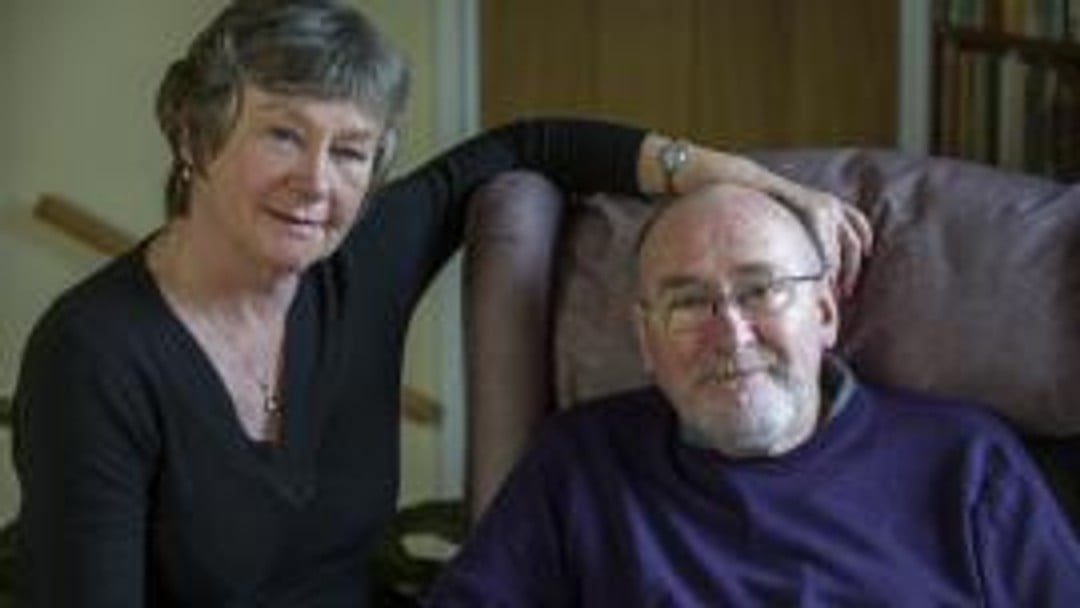Assisted-dying campaigners crowdfund court applications

Patients with incurable illnesses in new legal battle for right to die with dignity
Two patients suffering from incurable illnesses are crowdfunding judicial review applications in the hope of securing a declaration that English law is incompatible with their right to a dignified death.
Former social sciences teacher Noel Conway (pictured, with his wife, in December 2016) is seeking to have the ban on assisted suicide lifted for patients suffering from a terminal illness with a life expectancy of six months or less.
The second applicant, known only as Omid, would like the ban removed for patients suffering from incurable illnesses, which, although not terminal, lead to lifelong suffering and a shortened life expectancy.
Conway has already raised £30,000 and his Crowdfunder page suggests he is on course to reach his £50,000 stretch target by 7 April. Omid is looking for £10,000 by 20 April via CrowdJustice.
Earlier today, the two men applied to the High Court for permission to proceed to a full hearing.
Previous attempts to change the law have stalled but Conway’s lawyer, Irwin Mitchell partner Yogi Amin, said a declaration of incompatibility would force parliament to consider the issue again.
There is a precedent for that approach in Canada. A declaration by the Canadian Supreme Court in the Carter case in February 2015 led to the country’s government introducing assisted-dying legislation in June 2016.
Conway suffers from a motor neurone disease and has a limited life expectancy. Aside from a declaration of incompatibility, his application, which is supported by Dignity in Dying, also proposes a legal framework that would make assisted dying lawful.
This framework would only apply where patients are mentally capable, certified by a doctor, and suffering from a terminal illness with no more than six months to live.
The last time the UK Supreme Court was asked to consider a similar application was the Nicklinson case in 2014. The nine-justices bench agreed that judges were entitled to rule on the issue but declined Nicklinson’s lawyers’ invitation to find that the law was incompatible with article 8 of the European Convention on Human Rights.
At the time, MPs were debating the Assisted Dying Bill, championed by Lord Falconer and introduced in the Commons by Rob Marris, Labour MP for Wolverhampton South West. This was not the first attempt at changing the law but it was ultimately rejected by a 330-118 majority.
This made the presentation of a new bill on the issue less likely in the foreseeable future. But giving the leading speech in Nicklinson, Lord Neuberger said that if parliament was not prepared to address the question, ‘the issue of a fresh claim for a declaration is to be anticipated’ and there would be ‘a real prospect of their success’.
Lord Wilson went further, putting forward his own set of criteria where a court may, before the event, ‘be satisfied that a person’s wish to commit suicide was… voluntary, clear, settled, and informed’.
‘I put forward the factors with a view only to enabling parliament to appreciate the scrupulous nature of any factual inquiry which it might see fit to entrust to the judges of the division,’ he said.
Lord Neuberger found such an approach ‘somewhat premature’ and said it would be ‘a matter for parliament to determine the precise details of any scheme’. However, he went on, ‘that does not prevent the court from concluding that there are a number of possible schemes’.
At present, the default validation scheme for assisted suicide is the 2010 DPP guidance issued in the wake of the Debbie Purdy case. This provides that a suspect will not be prosecuted if, among other things, they acted out of compassion and did not stand to gain financially.
‘A system whereby a judge or other independent assessor is satisfied in advance that someone has a voluntary, clear, settled, and informed wish to die and for his suicide then to be organised in an open and professional way, would, at least in my current view, provide greater and more satisfactory protection for the weak and vulnerable, than a system which involves a lawyer from the DPP’s office inquiring, after the event, whether the person who had killed himself had such a wish, and also to investigate the actions and motives of any assister, who would, by definition, be emotionally involved and scarcely able to take, or even to have taken, an objective view,’ Lord Neuberger said.
Despite parliament’s overwhelming rejection of reform proposals, polls suggest there is growing popular support for the plight of individuals such as Conway and Omid. There remains concern over the possible abuse of the weak and vulnerable but taboos surrounding death are gradually being chipped away.
One obvious route opened by the Conway application would be to start with limited reform. This would make assisted dying lawful in a strictly defined set of circumstances.
Supporters of change have highlighted some flaws in this approach. Lord Neuberger himself said in Nicklinson that those not suffering from terminal illness but whose lives have become unbearable were arguably the ones who most needed the law to change.
But perhaps testing the boundaries of the law in a more controlled environment first, as proposed by Conway’s lawyers, would be a suitable step forward to start with.
Jean-Yves Gilg is editor in chief at Solicitors Journal
jean-yves.gilg@solicitorsjournal.co.uk | @jeanyvesgilg

